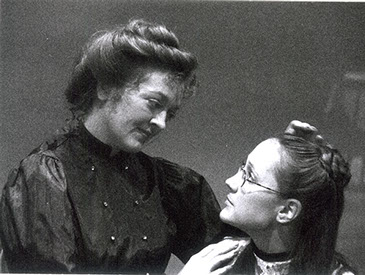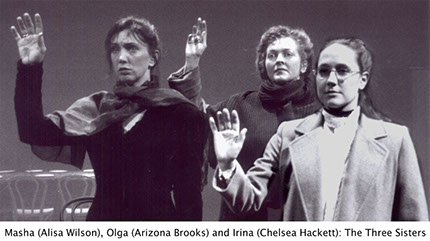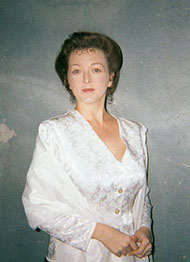

babbling brooks
things about stuff
The Three Sisters
Back Stage West
Reviewed by Laura Weinert
It has been said that the trap in staging this play about a group of eccentrics who are bored with their lives is to play it boringly, or so seriously and realistically that to watch them meander around bemoaning their aristocratic fatigue is fatiguing in itself. The other extreme would be to overact, so that characters become caricatures that are so ludicrously quirky that we fail to relate to any of them.
Director Florinel Fatulescu has decided to have it both ways, to great success. As with How To Explain Communism to Mental Patients (another recent Open Fist production under his direction), Fatulescu has again created a divine balance between mild realism and stylization. He seems to know precisely when a bit of zaniness would best serve the play and when it is better to strive for something slightly closer to real emotion. Wisely, he has cast a handful of skillful actors who can transition deftly between the two. We meet this group of unhappy aristocrats and lieutenants seeking meaning in life: through work, love, faith, family, or relaxation. As the play unfolds, we find each has his or her own odd tick, and, finally, his or her own kind of tragedy.
reviews

Three actresses who are as comfortable with satire as they are with seriousness portray our three sisters: Olga (a hopeful yet pained Arizona Brooks), Irina (a youthful, practical Chelsea Hackett), and Masha (an embittered, comical Alisa Wilson). Jeremy Lawrence is appropriately bizarre as Masha's Latin-spouting older husband Kulygin.
As Fatulescu has interpreted the piece, he insists on keeping us laughing, yet it is laughter for the sake of something, a dark kind of laughter that disguises one's identification with the existential predicament of the characters. The visiting Lt. Vershinin (a pensive, passionate Rod Sell) is by turns absurd and articulate in his constant desire to talk "politics," arguing that the present life must be suffering so that future generations will live in a better world. Providing the counterpoint is Baron Tuzenbach (Dietrich Smith), who argues that life can be happy and historically things don't change-birds will always fly. Joe Hulser is at first amusingly boorish as captain Solyony; then, by the end of the play, he emerges as a horrible brute of a man.
Echoing the grim truth that happiness and fulfillment are so constantly fleeting they leave us feeling cheated is the sad situation of the sisters' brother Andrei (Martin Bedoian), who settles for his fate as a hapless bureaucrat, henpecked by his twisted social climber of a wife, whose arch, irritating core is mastered by Amy Edlin.
A simple yet elegant set, dressed with a few antiques and barren crooked trees, provides an evocative ambience for this tale of non-fulfillment, in which our characters are left estranged with their common fates.

Review by The Los Angeles Times
'Sisters' of Hope
By JANA J. MONJI, Special to The Times
A Chekhov adaptation at the Open Fist features deft portrayals with a few rough transitions.
In Anton Chekhov's "The Three Sisters" at the Open Fist Theatre Company, director Florinel Fatulescu begins with the sisters lined up, and the eldest, Olga (Arizona Brooks), making wild-eyed pronouncements to the audience. This Brechtian device dissolves into more realistic portrayals of the doomed- to- spinsterhood Olga, the unhappily married Masha (Alisa Wilson) and the childishly enthusiastic Irina (Chelsea Hackett). They have pinned their hopes on their only brother, Andrei (Martin Bedoian), and they pine for the beautiful life in Moscow.
When a lieutenant colonel, Alexander (Rod Sell), comes from Moscow, the sisters worshipfully whisper "Moscow," each touching him as if to gather remnants of enchanted dust from the glorious capital city life. But over the next four years, familiarity fades this illusion and many others.
Andrei marries a woman who turns into a shrew, played with a fierce, snippy juxtaposition of false faces and smiles by Amy Edlin. Brooks' Olga is patient and finally world-weary. Lawrence's Fyodor is pragmatic--sadness and jealousy don't filter into his consciousness even when acknowledging his wife's love for Alexander.
But not all the acting and acting styles mesh comfortably. Some of the action takes place upstage, behind a screen that changes its translucency depending on Leif E. Gantvoort's sensitive lighting design. In this manner, Yevgenia Nayberg and Fatulescu's set design allows for a subtle layering of images that at times verges on poetic. But Fatulescu's beginning and ending--with the three sisters lined up, directly addressing the audience--need smoother transitions. Still, there are touching moments of tragedy and comedy, along with deft portrayals of people worn down by daily life and clinging to hope, that are well worth seeing.
* "The Three Sisters," Open Fist Theatre, 1625 N. La Brea Ave., Hollywood. Fridays-Saturdays, 8 p.m.; Sundays, 7 p.m. Ends Dec. 16.
Review by LA Weekly
by Steven Leigh Morris
THREE SISTERS Florinel Fatulescu’s staging of An ton Chekhov’s gentle and genteel four-act comedy (in Richard Nelson’s colloquial translation) — about life’s pointlessness, unrequited love and the search for grace — contains at least two, perhaps three different styles. Ranging from high tragedy to commedia, these styles clank against each other rather than meld, as obviously intended. The titular siblings — Olga, Masha and Irina (respectively Arizona Brooks, Alisa Wilson and Chelsea Hackett) — open and close the play presentationally, sharing Chekhov’s exposition as a wry audience-address. During which, Brooks’ Olga bursts into a pedantic style, causing feline Masha’s eyebrows to subtly rise. This slightly strained joke becomes emblematic of the production, as several of the actors seem to be in different plays. It’s as though Hackett’s low-key Irina comes from The West Wing; while Jeremy Lawrence’s fastidious schoolteacher, Kulygin (an extremely sleek and appealing portrayal), appears sprung from a Feydeau farce; while Rod Sell’s romantic officer Vershinin seems to have emerged from an Iowa cornfield. Furthermore, some of the actors appear insufficiently adept at executing the enormous stylistic shifts that Fatulescu demands in his decidedly Eastern European–flavored interpretation. Yevgenia Nayberg and Fatulescu’s minimalistic set design (door frames and portable set pieces) incorporates a translucent scrim running across the stage’s width, which bifurcates the stage into dreamy action behind the barrier and sharper action in front of it. This architectural divide provides a certain lyrical beauty but without a coherent view — rather like the production itself.
Open Fist Theater, 1625 N. La Brea Ave., Hlywd.; Fri.-Sat., 8 p.m.; Sun., 7 p.m.; thru Dec. 16. (323) 882-6912.

© 2016 arizona brooks creations, llc